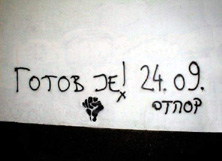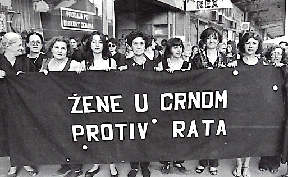
Belgrade, 9th of August 2000
Dear friends,
There’s always news in the totalitarian regimes, and it seems that the news never changes much. Some feminists are asking themselves if the Serbian regime is going to be one of the last totalitarian regimes in Europe (besides Byelorussia, and...).
Election Campaigns
The local and presidential elections in the Federal Republic of Yugoslavia have been announced for the 24th of September 2000. The opposition parties believe that they will win over Milosevic, the actual president of FR Yugoslavia, and that we shall get rid of him once forever! But. This means that many people are working in electoral campaign: the opposition parties, the non-governmental organizations (NGOs), women’s groups, students, etc. For example, there are five women’s networks lobbying on behalf of women’s political rights and they are all going at full speed. One is of the independent worker’s syndicate, one of women in media, one from women in political parties, and two are feminist political networks. They are all entering the campaign with the aim of strengthening women as political subjects, using the slogans “Vote of Women - Vote of Difference” and “Be Active.” In addition, the student movement OTPOR (Resistance) is doing its campaign with the slogan “GOTOV JE!” (“He’s finished!”—
Free B92 plans to organize rock concerts around the country and will support all the other independent campaigns, as will the independent media, which along with radio stations have been banned but are active in other different ways.
Opposition parties are predicting that if many people do vote there is a chance to get rid of Milosevic, finally! Therefore the general motto of the campaign is “COME OUT AND VOTE!”
For the election campaign, the Serbian regime is using various methods:
B. Announcing that all the medical treatments and prescriptions are free: this is a farce because the government and the medical institutions (all under control of the Serbian government) have almost no medicines to give away, and very few procedures can be performed for free in the medical institutions (most of the diagnostic equipment is broken, physicians and nurses are underpaid, etc.). This campaign is supposed to convey the impression to the wider population that the state takes care, while the state is pressing the workers in the medical institutions to do the impossible. There are rumours that medicines will last until the second round of the election and there will be no more afterwards!! There is already desperation among people, and the data indicate that life expectancy has decreased by seven years in comparison to 1990. (Data from the White Book of the independent G17 PLUS Association of Economists)
C. Controlling all the population through widespread police presence in public spaces. Last week I was relaxing with my friend Ria Convents in an open café-bar near the Danube, when at around 8:00 pm, 12 policemen and one policewoman entered and asked everyone to show their ID. Police are entering all the cafés, bars and restaurants constantly these days. (Permits are required for public gatherings in other locations.)
Financial Control of NGOs and Firms
Yesterday financial control officials entered another organization, the Center for Cultural Decontamination. They took away (and left receipts for) two computers in order to confiscate everything on the disks, looking for any facts to be used as evidence against the Center (the use of foreign currency, for example, because since the first embargo in 1992, banks for foreign currency do not exist in Serbia). The financial police are mainly hunting for evidence of “collaboration with the enemy”—
The regular police forces also are entering
offices of the non-governmental organizations that are working on supporting citizens to go out and vote, seizing printed records and computer harddrives. They have stopped a few concerts. They also harass some of the opposition parties, taking their material, etc. This is a daily activity of the police!
Pressure on Student Movement and Journalists
Police brutality on the streets against students from the OTPOR (Resistance) movement by police is continuous and systematic. Every week, some 30-80 young people from different towns in Serbia get beaten up and taken to the police to be investigated for their street actions, for which the OTPOR is known. The policy the OTPOR has is that they are horizontally organized, refuse to have leaders (that’s why so many get beaten up!), and have actions against Milosevic in about 40 towns in Serbia. In the town of Novi Sad, the “Resistant Mothers” group was founded to support their OTPOR children, and they have their own support activities. Some of “the mothers” have already been taken to the police for investigation.
There are only five independent papers left (three daily and two weekly) in Serbia, and the three daily papers depend on the state institutions which sell them paper. This means that the state has made it almost impossible for independent newspapers to buy printing paper. As for the TV: no independent TV is left, and only one radio station with a very small broadcast range, Radio Index in Belgrade, that few people can receive.
Flora Brovina Is Still in Prison
The human rights NGOs report that there are still 1,077 Albanians held in Serbian jails, there are 340 missing Serbs and over 2,300 missing Albanians from the last year of war. (Data from: Albanian Prisoner Advocacy List - Prisoner Pals The Kosovo.) The fact is that citizens from Kosova with Albanian nationality cannot enter Serbia with their IDs, while citizens from Kosovo with Serbian nationality can.
Poverty as Isolation and Human Rights Abuse
In a recent poll conducted with citizens of Serbia over the phone,
which means those who do not have phones are not counted, this is what was found:
The most important news is activities to educate women about the elections and political rights. Apart from this, women’s groups are continuing their projects.
The lesbian group from Belgrade, LABRIS, is planning the Second Lesbian Week for October 2000 (see schedule at Gay-Serbia.com). Women in Black are on vacation. The SOS Hotline is organizing a collective painting of their office!
There was also another important event last week: the party for the Roma Children’ Center moving into their new flat. (“Roma” is a term for Gypsy people, who live throughout Eastern Europe as third-grade citizens—
A. Distributing free flour, sugar and oil to the population. This is important in that oil and sugar can no longer be found in commercial shops: the state has taken these goods from the market and is distributing them from its own outlets, making people wait in long queues. Particularly in small towns, these staples are offered for sale during the two-hour periods when the opposition have their street meetings, forcing people to wait in queues instead of going to the opposition meetings.
 The news is also that one journalist, Miroslav Filipovic
(of the independent daily paper DANAS), was sentenced to seven years of prison under military law for “conspiracy and state spying” because he reported events from the war in Kosovo of last spring, especially the testimonies of Serbian soldiers. This is another of those acts of intimidation, like the killing of independent journalist Slavko Curuvija last spring.
The news is also that one journalist, Miroslav Filipovic
(of the independent daily paper DANAS), was sentenced to seven years of prison under military law for “conspiracy and state spying” because he reported events from the war in Kosovo of last spring, especially the testimonies of Serbian soldiers. This is another of those acts of intimidation, like the killing of independent journalist Slavko Curuvija last spring.
 As you might remember, the Albanian Kosovo feminist Flora Brovina was caught last spring during the ethnic cleansing in Kosovo and taken to prison with a 12-year sentence. We are sending her journals and instant coffee.... If anyone wants to send postcards of solidarity and support for her, write to:
As you might remember, the Albanian Kosovo feminist Flora Brovina was caught last spring during the ethnic cleansing in Kosovo and taken to prison with a 12-year sentence. We are sending her journals and instant coffee.... If anyone wants to send postcards of solidarity and support for her, write to:
Flora Brovina
KP Dom Zensko odelenje
12000 Pozarevac
FR Yugoslavia
(Interviews and telephone research by NIN, on 22 of July 2000.)

Back Next